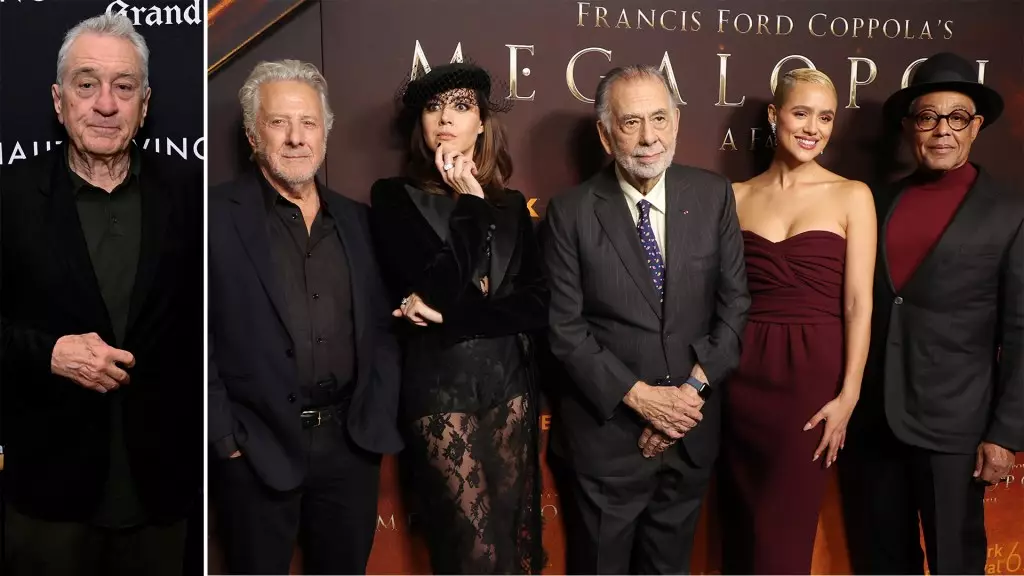At the New York premiere of Francis Ford Coppola’s much-anticipated film “Megalopolis,” held at the iconic AMC Lincoln Square IMAX, the atmosphere was rife with tension and humor. Among the notable guests were the legendary actors Robert De Niro and Spike Lee, who participated in a candid discussion that ranged from the film’s themes to prevalent political issues. De Niro, known for his stoic demeanor, drew laughter from the audience with a satirical proposal: “Just imagine Donald Trump directing this film.” The weight of his statement, however, lingered far beyond the laughter it provoked, revealing deeper concerns about leadership and creativity in America.
Coppola was joined by these titans in a Q&A session that served as an opening to discuss their film’s existential undertones and parallels to contemporary societal challenges. In a time marked by political polarization and uncertainty, their dialogues seemed to resonate more profoundly than ever.
As the conversation shifted from film to the political landscape, De Niro and Lee expressed their apprehensions regarding the current state of American democracy. De Niro, uncharacteristically animated, articulated a concern echoing many American voices: “I see the things in Francis’ film about that, the parallels and so on. It’s not over ’til it’s over, and we have to go at this wholeheartedly to beat the Republicans.” His impassioned call to action emphasized the importance of citizen engagement. De Niro underscored the dire consequences of complacency, urging all to participate actively in the electoral process.
Lee, unwavering in his support, echoed: “Forward not backward… This election is going to be very, very close.” This interjection highlighted the crucial nature of active participation, suggesting that the outcome hinges on the collective effort of every individual willing to cast their vote. With an upcoming election that looms large, their words extended beyond mere conversation — they served as a rallying cry for a nation at a crossroads.
Amid the political discussions, Coppola maintained an ethos of unity, illustrating that even in a divisive era, the creative industry can foster an environment of respect. “I deliberately cast actors who are voting another way,” he stated, implicitly recognizing the myriad perspectives that enrich storytelling. By not shying away from the fact that members of the cast might hold differing political views, Coppola aimed to illustrate the film’s core message—humanity can prevail even through disagreement. This idea of creative integrity echoed throughout the evening.
It’s vital to acknowledge the potential of cinema as a canvas for challenging societal issues. This film, which took two decades to bring to fruition, encapsulates a journey filled with passion, ambition, and vision. With a production budget of $120 million, “Megalopolis” is not just a film; it’s a statement about the evolution of society and the role art plays in reflecting our realities.
In a sentimental turn, De Niro and Coppola reminisced about their intertwined histories, recalling their formative experiences in the film industry. Their conversations invoked nostalgia, bringing to light cherished memories of filmmaking in the 1970s, especially their iconic collaborations on productions such as “The Godfather.” Lee contributed his own narrative, recalling how he attended the premiere of “Apocalypse Now” — another Coppola masterpiece — as an eager young student thrust into the world of cinema.
These narratives highlighted a significant theme: the evolution of storytelling and its reflection of cultural zeitgeist. Coppola’s “Megalopolis” aims to tackle not just the personal but also the political, engaging with themes pertinent to present-day America while drawing on the rich tapestry of cinematic history that preceded it. The film’s ambition, marked by its eclectic star cast, adds layers of intrigue to its forthcoming release, promising an engaging experience for the audience.
As “Megalopolis” gears up for its wide release by Lionsgate, anticipation remains palpable, tempered by the mixed reactions it received during its Cannes debut. Reviews varied, with some critics praising the film’s epic scale and ambition, while others pointed out its complexity and dense narrative. Nevertheless, Coppola’s steadfast commitment to the project speaks volumes about his vision and dedication to exploring the often chaotic interplay between art and reality.
In an era where political discourse is increasingly fraught, the voices like those of De Niro, Lee, and Coppola stand as crucial reflections on the interconnectedness of cinema and democracy. As audiences prepare to engage with “Megalopolis,” they are invited not only to witness a film but to reflect on the broader implications of leadership, creativity, and the power of the electorate in shaping the future. The narrative continues to unfold, both on screen and in the hearts of those striving for a more profound understanding of their society.


Leave a Reply